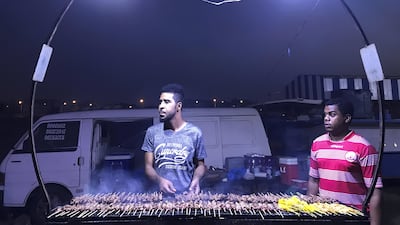When Issa and Ali Al Habsi got tired of asking their parents for money, they did what many young men in Seeb, on the outskirts of Muscat, do – they set up a grill on the street.
Two months later, they had enough money to buy a second grill – and a way of doubling their profits. Two years later, the money from those sidewalk sales of meat skewers, sold at 200 baisa (Dh2) apiece, has got the brothers a food van and plans to open a restaurant.
"In the beginning, our parents were supporting us," says Issa, 22, a mechanical engineer. "Now, we give them money."
Issa and Ali sell chargrilled skewers of meat, chicken, squid and prawns known as mashakik. Their van is one of a dozen parked on two sides of a busy road beside prestigious residential and commercial development The Wave.
There are scores of mashakik sellers in the seaside neighbourhood of Seeb, but the most ambitious are here; entrepreneurs, engineers, and chefs, building their capital one skewer at a time.
Omani cooking has the imprint of its former empire, which stretched from Gwadar, a port city in the Balochistan province of modern day Pakistan, to Zanzibar.
At the mashakik market, the flavours are Zanzibari and Omani, as vendors banter in Arabic and Swahili.
Over the years, the young men enlisted the help of mothers and aunties to lengthen their menus. Grilled quail, lamb chops, burgers, hummus, fries and Zanzibari chapatti are standard, but there are also a few family recipes on offer.
Each van has its own dish. Issa and Ali, who run Barbaqu Brothers, serve their aunt's potato soup and frozen tamarind juice.
________________
Read more:
Why young Omanis are turning to professional folders to perfect their national dress
An Omani Village Reunited for Eid
Omani cover of Despacito tackles burden of dowries
________________
Coals are lit just before sunset. Once maghrib prayers end, the dusty lot fills with cars, taxis and lorries.
This is takeaway, but not fast food. Mashakik is synonymous with the Seeb art of slow living, sitting at the seaside and chatting for hours.
The mashakik trend began a few years ago, when grills were set up along the waterfront to sell food to picnicking families. Since then, it has become more than pocket money.
Mohammed Al Riyami was working as a tour guide and life-skills instructor for Outward Bound before he decided to buy a van for 4,000 rials and make mashakik his full-time pursuit in 2013.
"I wanted to start my own business, and after teaching people about networking and leadership, I found out that I had all these skills," the 34-year-old says. "The past five or 10 years, most of the people wanted to work in government. But now they understand that in government they will stay at the same level; they will not improve. So they have to have their own business to reach the level they want."
Al Riyami employs three men and his business caters for parties and television crews.
His van, 77 Grill, was one of the first. Now, it is one of a dozen that have gradually upgraded into permanent structures. First, vendors added generator-powered lights, then tables and chairs, glowing signboards and even tile flooring laid on the dirt.
Last year, one food truck pulled up. Within a few months, two more appeared. Across the road, the Hilal Burger van brought in a professional chef from Zanzibar, Fahad Mabrouk.
Mabrouk's mother is Omani. When he met a mashakik entrepreneur in Zanzibar, he did not hesitate to quit his job as a hotel chef, where he had grown tired of cooking the same buffet dishes every day.
"Rice, sauce, grilled chicken, macaroni, international pizza," he recalls with a sigh, adding that in Seeb, he earns more and works less.
Mabrouk, 27, is one of nine people working at Hilal Burger, which sells about 2,800 skewers on weekends and 2,300 on weekdays. Their speciality is lamb burger with spicy mayonnaise. They earn about 800 rials per night on weekdays.
For Issa and Ali, a student job has become a full-time business. Ali has recently graduated as an oil-and-gas engineer and wants to open a restaurant that he can manage when he is in Muscat.
It remains to be seen whether the lot will develop into a permanent market. A few weeks ago, a barrier was placed between the vans and the sea, for the expansion of a nearby development. There is talk of a relocation, as well as rumours among the vendors that the government will give them a new space.
In a city suffering from low oil prices, the mashakik entrepreneurs may have found a recipe for success.

